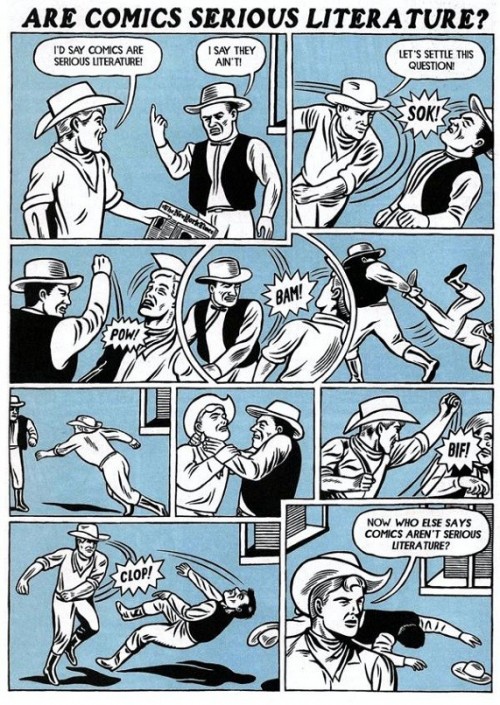As regular readers know, over the last month and a half or so the blog has been engaged in a sporadic roundtable on the place of the literary in comics. I was recently reading the 1983-84 volume of Fantagraphics Peanuts collection, and came across a strip that seemed like it had interesting things to contribute to the discussion. Here it is:
So what does this have to say about the literary in comics? Well, several things, I’d argue.
First, and perhaps most straightforwardly, the strip can be seen as an enthusiastic endorsement of literariness. Schroeder — the strip’s most ardent proponent of high art — quotes Thomas Hardy. The second panel is given over almost entirely to Hardy’s words, which take up so much weight and space that they almost overwhelm Schroeder’s earnestly declaiming face. Lucy — Schulz’s go-to philistine — expresses indifference and self-righteous ignorance — for which she is duly and gratifyingly punished by Schroeder, who pulls the piano (marker of the high art she’s rejected) out from under her. Bonk!
In terms of the debate we’ve been having on this blog, you could easily see this as a pointed refutation of Eddie Campbell’s rejection of literary standards and literary comparisons. Campbell’s argument that literariness is not relevant to comics seems to fit nicely with Lucy’s “Who cares?” — while Ng SuatTong’s ill-tempered riposte seems quite similar to Schroeder’s.
On second thought, though, Schulz’s attitude towards literariness can be seen as a little more ambiguous. It’s true that Schroeder, the advocate for high art, gets the last word. But the last word he gets is not precisely high art. On the contrary, it’s slapstick. The point of the strip, you could argue, isn’t the Hardy quote, which ends up essentially being little more than an elaborate set-up — it’s literariness there not for its high-art meaningfulness, but simply to signal “high art meaningfulness.” The real pleasure, or energy, of the strip, is in that last image, where Schroeder pulls out the piano — almost throwing it over his head and off panel, as if to toss aside the very possibility of including high art in a comic strip. From this perspective, the strip might be seen as being in the vein of Michael Kupperman’s “Are Comics Serious Literature?” (HT: Matthias.)
The point isn’t so much to advocate for literature as it is to use comics to giggle at the idea of advocating for literature in comics — a position that Eddie Campbell would probably find congenial.
One last, perhaps less schematic,possibility is to think about the strip in terms of gender. It’s interesting in this context that, while Schroeder is generally the advocate for high art, he’s also generally uninterested in, or immune to, the appeal of romance — he’s one of the few characters in the strip who (as far as I’ve seen) never has an unrequited crush. Lucy, of course, has a crush on him, and it’s usually she who brings up images of marriage or love or domestic bliss, only to have Schroeder disgustedly reject them.
This strip is different, though. Hardy’s words are not just a default marker of high art; they’re in particular a paen to a woman’s (or a particular kind of woman’s) “marvelous beauty,” and a speculation — with more than a little longing — on who such beautiful people marry. It sounds more like something Charlie Brown would say about the little red-headed girl than like something Schroeder would say to Lucy.
Lucy’s lack of interest, then, can be seen as not (or not merely) philistine, but as tragic — Schroeder is finally, finally talking to her about love, and she can’t process it or understand it.
You could attribute this to her soullessness, I suppose — she is blind and doesn’t deserve love. But you could attribute it to Schroeder’s soullessness. Certainly there’s a cruelty in babbling about the beauty of random unobtainable women to someone who you know is head-over-heels in love with you. For that matter, the Hardy quote itself seems to exhibit some of his most maudlin and least appealing tendencies; it’s pretty easy to read it as a self-pitying lament for the fact that beautiful women are human beings, rather than simple objects to be collected by men who admire them in the street. The high-artist idealizes Woman and ignores the woman sitting in front of him. Lucy’s utter indifference could then read as a recognition that Hardy is indifferent to her — and Schroeder’s violence as a tragi-comic extension of Hardy’s violence. In this case, the literary is neither defended nor ridiculed, but is instead a kind of doppelganger — a shadow of meaning cast by the comic, the meaning of which is in turn cast by it.
Literature, then, appears for Schulz in this strip as an ideal, a butt, and a fraught double. As I’ve said on numerous occasions, I don’t really have any problem comparing comics and other forms (Charles Schulz is a greater artist than Thomas Hardy, damn it.) But I do feel like the anxiety around those comparisons, in every direction, sometimes ends up drowning out potentially more interesting conversations about how, and where, intentionally and despite themselves, comics and literature can meet.


